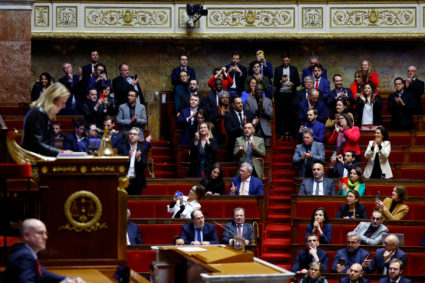One week after former President Donald Trump announced he would seek reelection, he dined at his Mar-a-Lago home with two men known for their racist and antisemitic beliefs: Nick Fuentes and Ye. Mary McCord of the Institute for Constitutional Advocacy and Protection and Stuart Stevens of the Lincoln Project joined Laura Barrón-López to discuss what this means for Republicans.
Read the Full Transcript
Notice: Transcripts are machine and human generated and lightly edited for accuracy. They may contain errors.
-
Judy Woodruff:
One week after former President Donald Trump announced that he would seek reelection to the nation's top office, he dined at his Mar-a-Lago home with two men known for their racist and antisemitic beliefs, 24-year-old political commentator Nick Fuentes and Ye, the hip-hop musician formerly known as Kanye West.
Laura Barrón-López has more.
-
Laura Barrón-López:
The Department of Justice identified Fuentes as a white supremacist last year. He is a Holocaust denier who has threatened violence against Jewish people and spread hate against Black Americans and other groups.
Ye has also been condemned for antisemitic and anti-Black comments. In statements, Trump claimed Fuentes was invited by Ye and that he did not know him. The dinner is the most recent example, however, of the former president associating with bigoted individuals and conspiracy theorists and elevating their ideas.
Democratic Senate Majority Leader Chuck Schumer responded on the floor today.
-
Sen. Chuck Schumer (D-NY):
For a former president to sit down and have dinner with a high-profile antisemite is disgusting and dangerous. To give an antisemite even the smallest platform, much less an audience over dinner, is pure evil.
Even assuming the former president didn't realize Mr. Fuentes was coming to Mar-a-Lago, for him to refuse to condemn Fuentes and his bigoted words after the dinner is appalling, and it is dangerous.
-
Laura Barrón-López:
We asked every Republican senator and every member of Republican House leadership today whether they thought the meeting was appropriate and if they condemned it.
Louisiana Senator Bill Cassidy said: "Trump hosting racist antisemites for dinner encourages other racist antisemites."
And Maine Senator Susan Collins told us "NewsHour": "The president should never have had a meal or even a meeting with Nick Fuentes."
The vast majority of them did not respond to us.
For more on what this means for the Republican Party. I'm joined by Mary McCord. She is the director of the Institute for Constitutional Advocacy and Protection and a former Justice Department official. And Stuart Stevens, he is a former Republican consultant now at The Lincoln Project and a new pro-democracy media platform, Resolute Square.
Thank you both for joining us our today.
Stu, I want to start with you.
As Republican senators were returning to Washington this evening, they were asked by reporters about the dinner, and a number of them said that it was — quote — "inappropriate, that it was wrong, that there's no place for white supremacy in the Republican Party."
Separately, former Vice President Mike Pence said that Trump should apologize for the meeting. What's your assessment of the Republican response so far?
-
Stuart Stevens, The Lincoln Project:
Well, look, I think this has to be taken in context of what has happened to the Republican Party, which, in my view, is a complete moral collapse, unlike any we have really seen in America with a major political party.
This happened in Florida. The governor of Florida, Ron DeSantis, as far as I know, has yet to assert that Joe Biden won a legal and fair election. We talk about election deniers, but we focus on those who are out there campaigning on it. But the vast majority of elected Republican officials are yet to say that Donald Trump lost a free and fair election, which is — they're — that is — how extreme can that be?
That means that we don't live in a democracy. It means that they're participating as elected officials in something that is not a democracy. So, this sort of extremist conspiracy theories have been allowed to grow in the Republican Party because it's lost touch with any governing philosophy.
No one can articulate a realistic center-right governing philosophy with any credibility.
-
Laura Barrón-López:
Mary, on Nick Fuentes specifically, what should our viewers understand about him and his role in Republican politics?
-
Mary McCord, Former Justice Department Official:
So, he is a white supremacist who really kind of rose to some prominence after the Unite the Right rally in Charlottesville, Virginia, in 2017, where he was present.
He's been most recently very active in organizing Stop the Steal demonstrations back in 2020 and 2021. And he is someone who advocates Great Replacement Theory. He's someone who really, though, tries, I think, to have a political influence, an influence on the Republican Party.
And he's done this by creating his own organization, America First, his own PAC, the America First Political Action Committee, which essentially competes with CPAC, the Conservative Political Action Committee, to pull candidates and politicians even further to the fringe.
I shouldn't say even, but just to the fringe, further to the fringe. And this is something that is really dangerous right now, because it generates more and more publicity for himself. It generates more and more profit for himself. But it makes too many of our politicians right now feel like they need to pander to him, that they have something to lose if they're not able to pander to him and to his base.
And I think that's exactly what we saw with the former president having dinner with Nick Fuentes. I don't personally believe that he didn't know who Nick Fuentes was. Nick Fuentes has his own PAC and has supported President Trump. He was a major proponent of Stop the Steal rallies. It just defies logic that the former president would not know who he is.
-
Laura Barrón-López:
And Fuentes, as you noted, Mary, isn't new on the scene. Representatives Marjorie Taylor Greene of Georgia and Paul Gosar of Arizona spoke at Fuentes' white nationalist conference earlier this year.
And yet there was no vast Republican condemnation of it across the party.
Stu, what roots do you see of this? Why do you think that these figures are accepted within the Republican Party?
-
Stuart Stevens:
Well, I think the Republican Party has, sadly, accepted its role as a white grievance party.
I mean, this goes back to really the history of the post-World War II Republican Party. There were really two strands. There was an Eisenhower strand, which was boring, governing, sane, and then a Joe McCarthy strand which was xenophobic, conspiratorial, often racist.
And these two have battled each other. And a lot of us who particularly were involved in George Bush's campaign, with compassionate conservative, we assumed that we were the dominant gene in the party, and that we knew this dark side, but we thought that it would go away, if only for the necessity of adopting to a changing America.
But I don't know any conclusion to come to but that we were wrong, and the other was the dominant gene. And this party has a history of this. Right now, there's a great nostalgia, call it, for William Buckley as the intellectual voice of the party, but we forget William Buckley started out as a cold-stone — stone-cold segregationist.
He later recanted, and I think genuinely so. But these are the roots of the Republican Party; 85 percent of Trump's vote was white in a country that is somewhere between 57 and 60 percent white. And that pretty much says it all.
-
Laura Barrón-López:
Mary, when voices like Fuentes is and Ye, who has said that slavery was a choice, get a meeting with the former president, and they're associated with other GOP figures, what signal does that send not just to Fuentes' followers, but also to Republican voters?
-
Mary McCord:
Well, I think what the former president and so many other politicians who will associate openly with white supremacists and antisemites, I think what they're trying to do is, they're trying to — they're trying to walk this fine line.
They're trying to appeal to the base, who is really motivated and turned on by this type of racist content, antisemitic content, embracing Great Replacement Theory, putting aside and undermining all semblance of democratic processes in America. They want to continue to appeal to that base, but then they want to have this plausible deniability of, oh, I didn't know who he was, oh, I didn't understand what his philosophy was, oh, he just came as a guest of Kanye West.
They want to be able to say that in order to not completely abandon those who are less on the fringe of their party. Well, they just can't have their cake and eat it too. These things are not debatable. They should not be debatable in politics. There was a time not that not that long ago, where this would have been just condemned in the strongest possible terms across the party.
And we're not seeing that right now. And so the message it sends, it's dangerous. It is making it acceptable to not only hold these views, which, of course, is protected to hold these views by our Constitution, but to espouse those and to try to influence policy with types of theories and ideologies that are extremists, that are polarizing, and that are violent.
-
Laura Barrón-López:
Mary McCord, Stuart Stevens, thank you so much for your time.








